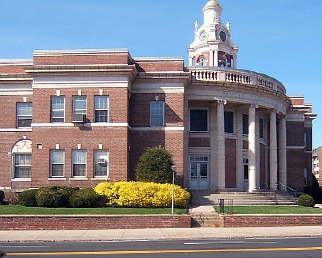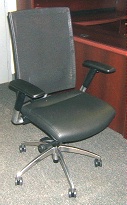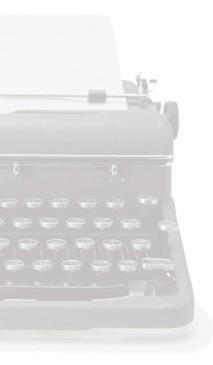 |
|
October 17, 2006
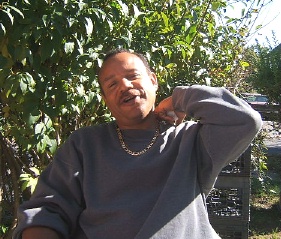
Leonardo Melendez, 48, aircraft mechanic, Newhall remediation activist
Photo/Sharon Bass
By Sharon Bass
In 1987, Leonardo Melendez moved into his grandmother’s Newhall Street home. He’d just gotten divorce and his grandma needed help. Two years later, he bought a house nearby at 332 Augur St. Ten days later, the tornado blew it away.
When his grandmother died of cancer three years ago, Melendez said he vowed to keep fighting. He thinks the contamination may have caused her fatal illness.
On Oct. 30, neighbors will gather at 7 p.m. in the Keefe Center to discuss three competing remediation plans. One was crafted by the DEP, which the NAC unanimously voted down; another was written by the NAC, which is basically the same extensive, 100 percent cleanup proposal the DEP already denied; the third is a modified plan that is less invasive, extensive and expensive than the other two.
When the yards are cleared of contaminants -- or if it becomes clear remediation won’t be done after all -- Melendez said he’s outta there. He’s got his eyes on West Haven. Meanwhile, he’s staying put to carry out his grandmother’s last wishes.
Hamden Daily News: How did you find out your yard is contaminated?
Leonardo Melendez: My grandmother got a letter from the mayor’s office [Carl Amento]; they were talking about possibly buying her out. So what happened was we found out about the [middle] school and the hazardous waste. I lived only a block away but I didn’t know anything about it. The only reason I knew about this was because of my grandmother. So she asked me to look into it for her because I’m the oldest grandchild.
HDN: Did your grandmother get involved?
LM: She was going to all the meetings [from 1999 to 2000] that they had at the school because they were worried the school would have to move and that the houses in front of the school would have to be knocked out. So she was getting involved.
HDN: You’ve been involved in the two Newhall groups since their inception in 2000. Has there been a lot of turnover in membership?
LM: I see different people coming out because the people who had the energy in the beginning are all tired out and they’re willing to come out but only if something is being done. If they don’t see anything being done, they don’t bother coming out.
HDN: How contaminated is your property?
LM: It’s contaminated but not highly contaminated. Back when I built the house I shielded it off with like 30 yards of topsoil. I pretty much sealed it out. I put about 10 inches of topsoil all around my property, not realizing we had a problem. I just did that to grow grass.
HDN: When your home was rebuilt in 1989 and the earth was disturbed, did you see any evidence of a dump?
LM: There was evidence there was a landfill. You could see that.
HDN: What did you find?
LM: We seen a lot of glass, a lot of char and charcoal and things of that nature. But I didn’t question it. I thought it was clean fill and we could continue with the construction.
HDN: What do you think is going to happen to this neighborhood?
LM: We’re trying to get 100 percent cleanup. We’re just trying to restore the neighborhood back to the way it was.
HDN: Which of the three plans do you favor?
LM: I think we should have 100 percent cleanup.
HDN: And that’s the plan the DEP said no to.
LM: Right.
HDN: And the idea is to resubmit it?
LM: That’s not the idea.
HDN: Do you think people have gotten sick from living here?
LM: Well, indirectly because you can’t prove it. It’s hard to prove because, of course, no one’s going to admit that the sickness or illness came because of the contamination of the land. Because there are so many cancer victims and so many other types of illnesses and they don’t want to relate it to anything contaminated here. I think it’s a long-term thing. It’s not something that you get sick overnight. No. It’s something like being in the area for 30, 40 years, I see people get sick.
HDN: What have you seen?
LM: Nausea, respiratory problems, hard to breathe. My grandfather, that’s what he died of.
HDN: Of what?
LM: He died of respiratory problems.
HDN: Was he a smoker?
LM: Um, I don’t remember if he was a smoker or not. He died the year I came home out of the Marine Corps, and at the time they [grandparents] were living at 513 Newhall St. The reason why I am so highly involved is because my grandmother’s house was high toxic waste. Her house was falling apart. Her house is definitely one that has to be knocked down. And then she died three years ago of cancer.
HDN: How old was she?
LM: She was 83. And there was no way I could prove it [the contamination caused the cancer], you know? That’s why I’m in this neighborhood. Because my grandmother lived down the street. After my divorce, I stayed with her for a couple of years. She had a problem maintaining her house so I bought a house close by to be able to take care of her house, not realizing the whole area [is contaminated].
HDN: What was your reaction when you learned about the old landfill?
LM: If I knew that I would have never bought this house.
HDN: Regardless of how much contamination there is here and how much gets cleaned up, this neighborhood has been stigmatized, possibly forever. Are your friends afraid to visit you because of that perception?
LM: Yeah, they talk about it. I do have quite a few people not coming over because of that. We meet elsewhere because of the fact this is hazardous waste.
HDN: Do they think they’ll get cancer?
LM: No, I don’t think they think they’re gonna get cancer, but they know it’s a toxic area and they prefer not to come to this area.
HDN: Are you afraid?
LM: I’m not afraid. My grandmother, when she passed away, she told me to make sure everything got cleaned up. But I didn’t realize it was gonna take so long. That’s why I’m really here.
HDN: What happened to your grandmother’s house?
LM: We sold it to a Mr. Clark and Mr. Clark rents it out. He doesn’t live there per se. He bought the house. Fixed it all up.
HDN: You said it will likely be torn down if there’s a remediation.
LM: Yes. It’s highly contaminated. I most have put a foot of topsoil over a period of 20 years and you can still see the house sinking.
HDN: Do you feel you were duped when you bought in this neighborhood? Do you think someone should have told you about the landfill?
LM: Oh, yeah, yeah. The way Olin was talking to me [years later] they said I knew. I didn’t know anything. There’s no way I would have talked my grandmother into staying here and there’s no way I would have bought this house here and take care of her there.
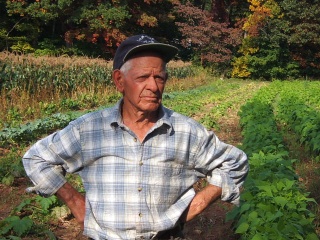
Arthur Vignola, 89, Hamden farmer, father and workhorse
Photo/Sharon Bass
By Sharon Bass
The Maselli Farm. The Dadio Farm. The Vignola Farm. The first two are destined to sprout new homes. The third is safe from residential developers, for now. But local open-space activists aren’t taking any chances that the Paradise Avenue produce farm will stay that way. So the Hamden Land Conservation Trust is trying to raise $495,000 to buy the development rights to 12 of Arthur Vignola’s 20-acre paradise. (The state owns eight acres because they’re on flood plains.)
That's more than OK with Vignola. He’s determined as a bull to keep his farm a farm. He promised his late wife.
After all, the Vignola Farm belonged to her family since the 19th century and her husband vowed to never sell out. They built a house on the property in 1960, and Arthur said he became an instant farmer. It’s kept him in unusually great shape -- physically and intellectually -- especially for someone pushing 90. Or even 60.
The farmer said he expects his sons, Robert and Keith Vignola, to continue the family tradition when he’s gone. Meanwhile, Arthur toils sun-to-moon, seven days a week, doing what he seems to have been born to do.
Hamden Daily News: What do you grow here?
Arthur Vignola: Starting from strawberries to sweet corn and a lot of tomatoes and eggplant and a lot of soul food and Christmas trees.
HDN: Do you ever take a day off?
AV: When it rains.
HDN: Before you got married and started farming, what did you do?
AV: Well, I peddled papers until I was 20 years old. Couldn’t find a job because of the Depression. Then I helped one of my brothers. He had a trucking business for a while. Then when I got married, I married a farm girl and she was interested in [keeping her family farm going]. And if she didn’t, it wouldn’t be open space today. I always have that in mind. One of her wishes was that I kept it open as long as I could. That’s one of the main reasons I want it to continue that way. As open space.
HDN: And you don’t want anyone to develop houses here?
AV: No, no! I’m not interested in that one bit. If they put homes on this property, nobody’s going to own them anyway between the state taxes and the government taxes and town taxes, the town owns the houses through taxation.
HDN: Tell me what it’s been like living and working on this farm.
AV: I enjoy it and I wouldn’t change it. I’ve had a great life. I’m not in want of anything. I enjoy the planting and the picking and the public that comes in here to buy [produce].
HDN: Where were you born?
AV: On Arch Street. From the bottom of Arch Street on was all farms. And all my friends were farm kids. During the Depression they were the most affluent people in town. They were the only ones who could hire people. Factories were closing down.
HDN: You’ve watched many of those farms close down, huh?
AV: Yeah, I’m the oldest one of all the farmers. I was the youngest one time. Now I’m the oldest. It saddens me that [farms] were developed. Brings back a lot of memories. Most of them were friends of mine. Breaks your heart sometimes. You know where Southern Connecticut College is?
HDN: Yeah.
AV: That was one of the biggest farms around.
HDN: How often do developers contact you about buying your property?
AV: At times they call me. Over the years, every once in a while one bounces up. But I’ve never been interested in selling.
HDN: How much have they offered you?
AV: They never offer. I don’t even want to know a price. I just enjoy being here. I’d like to see it stay this way. Because if I pass away tomorrow if I don’t put it this way, it might be sold the next day. Like I told you at the beginning, it was one of my wife’s wishes. She preserved the farm 60 years ago. You follow me? Her brothers didn’t want to know nothing. They gone gambling. When I come out here [in 1960] it was beautiful. It was a no-man’s land. Nobody was here. Only just a couple of dairy farms. This was a place like heaven. Then I’ll tell you another thing. Eighteen years ago, I came down with cancer. And I had three major operations and I was going to retire from farming and I was sitting alongside the surgeon, he said to me, ‘You’d better go back and pace yourself and go back to doing what you were doing.’ And I listened to him.
HDN: And you recovered.
AV: Yeah. I always had my mind off the disease. And even up to now, this year I broke down with lymphoma, another form of cancer, and last week I finished treatment for it. And that’s all gone. I worked [on the farm] with the treatment and all just like I did any other summer. As a matter of fact, this is the hardest summer I had because of the weather. And I didn’t tire. I felt good. I never felt sick.
HDN: What kind of treatment did you get?
AV: They gave you chemo. They put it in your vein.
HDN: You didn’t lose your hair.
AV: I didn’t lose nothing.
HDN: You didn’t get nauseous?
AV: Nothing. I ate the same. I went right back to work as soon as I came home [from treatments]. I figured that was a lot of my therapy. Get my mind off the disease. I didn’t feel sick when I had it [lymphoma].
HDN: So farming means a lot of things to you.
AV: Yeah, it means a lot. Besides money and all, I think it meant a hell of a lot more. The good earth has treated me pretty good.
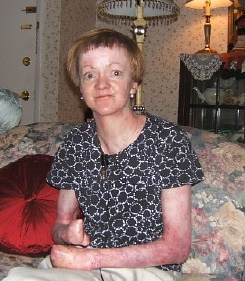
Photo/Sharon Bass
Amy O’Neill, 49, amazing woman
By Sharon Bass
It doesn’t take long to forget Amy O’Neill has a serious skin disease that has caused disfigurement and has robbed much of her life since birth. Or rather, has tried to rob her life.
Her tiny hands are permanently balled up and look fingerless, though they’re not. From head to toe the 49-year-old Hamden woman has red, raw skin that blisters and turns into cancerous tumors. Her legs are wrapped in layers of gauze to prevent infection. It takes her three hours every day to wrap them. She’s fragile and diminutive.
But what a boxer -- and what a charmer. And it's that charm that quickly makes you blind to what O'Neill's disease has done to her body and focused instead on how nice it is to just sit and chat with her.
After a lifetime of combating recessive epidermolysis bullosa -- a degenerative skin disease that usually takes its victims early in life; O’Neill might be the oldest-living person with the condition -- and 200 surgical operations and always counting, it is truly amazing what a fighter O’Neill is. She’s refreshingly open and sweet, and grateful to be a part of this world.
Her battle is broader than her skin disorder. For many years, she struggled to pay her medical bills. Her antibiotics, bandages, medications and other health needs amounted to more than her income. She couldn’t afford to buy a bed. She couldn’t afford lots of stuff.
Her financial situation took a turn for the better, she said, about seven years ago. The Hamden community went to bat for her. Five years ago, O’Neill was the sole recipient of the proceeds from Chevy Car Club Memorial Day weekend show at Quinnipiac University. She still gets donations from the car club. The Hamden police have sponsored hockey games to raise money for her. And the Elks Club and New Haven Board of Realtors have also been generous to O’Neill. In fact, community members started the Amy O'Neill Fund, which relies on voluntary donations.
Her story is being documented by her “best friend” Jack Gambardella, a New Haven videographer. O’Neill said she doesn’t want to see the finished product.
Hamden Daily News: What should people know about EB?
Amy O’Neill: It’s an extremely rare skin disease. The type I have, which is the recessive type, is the most severe. It turns it there’s maybe one in a million births that you would have this type of severity. It’s always congenital.
HDN: How did it affect you growing up?
AO: It was tough. It was tough.
HDN: Did you have visible signs of the disease then?
AO: At 12 hours after birth, my fingernails fell off and my toenails fell off and I started to blister. And they thought I had impetigo in the nursery so they separated me from everybody. At the age of maybe 5 is when you could see the disease because I had open wounds on my legs, and my fingers started to curl in, which is from the constant blistering, because actually I do have my fingers but they’re all blistered and curled and healed into the skin. It’s progressive. I’ve had surgeries to open up the fingers and thumbs. What’s been happening over the past four or five years, the older I get with it and because of blistering and healing and breakdown, a cycle that goes on and on and on, the normal thing that happens is that the cells that keep healing and healing and healing go right into cancer. So it takes one of these little cells to go haywire and it makes a tumor. I’ve had close to 70 tumors over the past four and a half years.
HDN: I understand you’re disabled now, but was there a point in your life when you could work?
AO: I went to a two-year business school and graduated with an associate’s degree. And after that, I was able to work full time for five years. And I loved it. I loved it. I was working in the administrative part in the operating room at Yale. At that point the disease really started to progress. It was so hard keeping up with 40 hours of work and then three hours of dressing changes a day. And keeping up with the food end of it.
HDN: The food?
AO: Well, I have to have soft food, so any kind of meat I have to put through a food processor so it comes out almost like a paté. Because if I don’t do that and I swallow it, it would scratch my throat and I would end up with blisters all in my throat. I had to have my esophagus taken out and replaced with my colon back in 1979, I think it was.
HDN: How come you don’t seem bitter?
AO: I just like everything so much. I mean I literally have interests in everything. I like to do things. I mean I just love like everything. I really do. And I think that’s probably a huge part of what gets me through all this really, really hard stuff. But it’s to the point now that I’ve had so much surgery and so much cancer that I look at every day as a gift. This is the first time in so many months, I don’t have a tumor. It’s incredible.
HDN: You say you love everything. Would you elaborate?
AO: Well, I used to be able to draw a lot. I did so many drawings of flowers. This was probably 1980 through 1995, where I could watercolor and acrylic and pen and ink and pencil. I had a lot of shows at hospitals, libraries and banks and won all kinds of awards.
HDN: Do you have any of your artwork?
AO: It’s gone. It’s gone. Sold it all. The worst part is I can’t draw with my right hand anymore. It would require a lot of surgery. That was a huge thing for me. It was a hobby and good thing for me to do. I tried drawing left-handed, but that’s an entirely different thing for me. [laughs] It doesn’t work the same. Now I wish I had saved a couple of paintings. Now I enjoy reading and knitting [on a plastic stand that holds the yarn]. And I like to get out a lot. I’d rather be out with people. I belong to a tai chi class at the library with seniors. [laughs] It’s a really big class. I also belong to Bally’s because as I get older my skin is getting tighter, along with blistering and cancer and all that, it’s also pulling everything really tight. Like when I get up in the morning I have to sit on the edge of the bed for a while because otherwise I'd just fall over because everything is so tight. So I have to ride a bike so two to three times a week I go down there [Bally’s] and ride the bike and that gets my legs going again.
HDN: And that gets you out.
AO: Yes. I got to know the people there and everything. All this stuff literally keeps me going. It takes a lot of work to maintain the very basic level of living. By that I mean food preparation. There’s a lot that goes into it.
HDN: Do you have a nursing assistant?
AO: No. The only time I do is when I come home from the hospital I have the VNA for a number of weeks.
HDN: Why does it take three hours to bandage your legs?
AO: It takes time to set up all the dressings, which I put on the bed in a certain way, with dressings, the medications, the scissors, the needles, the ACES, all that stuff. And I have to take off the old dressing first. It’s maintaining everything in a very clean way. I’m constantly blistering. Wherever there’s a blister it’s got to be broken with needles. If I don’t do that, within hours it would be this big [spreads arms out halfway].
HDN: Can you tell me about the documentary that is being made about you?
AO: My best friend, whom I’ve known for about 30 years, has really taken an interest in the disease. And he’s been documenting my life over the years. He did a lot of interviewing.
HDN: Looking forward to seeing it?
AO: I don’t think I want to see it, to tell you the truth. I have to keep some of this at a distance. It’s kind of a tough thing to figure out what I’m saying.
HDN: Do you imagine your life without this disease?
AO: I do. I do. It’s funny, I’d say I think about that a little bit every day.
HDN: What do you think?
AO: First I think I can’t imagine, it must be incredible to be someone who wouldn’t have a health condition such as this. I think about what I would do. The first thing I think about is being able to take a shower and not have to go through setting up the dressings, taking off the old ones and the hours it takes me. [softly laughs] So that’s the first thing I think of. If I didn’t have this disease I could jump out of bed, go right into the shower get dressed and go. You know, go to work. Do the normal everyday thing. That’s the best.
HDN: And you never had that?
AO: No. I never had that.
HDN: At the same time you sound so grateful for what you have, I wonder if you have more peace of mind than many.
AO: I think I have huge peace of mind but it’s something I can’t explain. I am extremely grateful for everything. Just for another day of not having to worry about when I have to go back for surgery. The tumors are becoming more aggressive.
Site designed by Joanne Kittredge
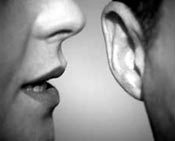
Tip Us Off
Send
news tips

